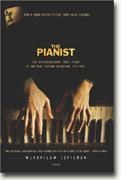The Pianist
Wladyslaw Szpilman
book reviews:
· general fiction
· chick lit/romance
· sci-fi/fantasy
· graphic novels
· nonfiction
· audio books
· author interviews
· children's books @
curledupkids.com
· DVD reviews @
curledupdvd.com
newsletter
win books
buy online
links
home
for authors
& publishers
for reviewers

 |
The Pianist: The Extraordinary True Story of One Man's Survival in Warsaw, 1939-1945 Wladyslaw Szpilman Picador Paperback 224 pages January 2003 |
|
Vladyslaw Szpilman was just beginning his career as a concert pianist when Germany invaded Poland in September, 1939. Living with his parents, a brother, and two sisters in the sophisticated, cultural city of Warsaw, he was playing Chopin’s Nocturne in C-sharp Minor on the radio when the attack began. Six years later, when the radio came back on the air at the end of the war, he was on hand to perform the same Nocturne. Between those two parentheses, Szpilman survived through luck, courage, the support of Polish friends and the kindness of an anonymous German officer.
This book intrigues the modern-day reader because it includes not only Vlad’s personal story but also excerpts from the diary of the German officer who hid him in the ruins of Warsaw during the final days of the war, bringing him food and warm clothing. Vlad lost everything. At first it was his job -- then he and his family were walled into a ghetto. Food became scarce. Friends were killed or taken away. Bodies littered the streets. Living became the central focus of his life when the Szpilmans were selected for "resettlement". As they were being pushed toward the train station at gunpoint, someone grabbed Vlad by the collar and pulled him back. The crowd separated him from his family. He threw himself against the guards, eager to get back to his parents and siblings. At that point, being alone was far more frightening than what awaited his family at Treblinka. His father paused, looking around for him, and waved before entering the cattle car. A policeman told Vlad to run. And run he did -- back through the streets of Warsaw to hide for the remainder of the war. Days of endurance turned into months and then into years. His account of being alone in a dying city, faced with starvation and hypothermia is heartbreaking. Even more heartbreaking and pertinent to what’s happening in the world today are the plaintive entries in Wilm Hosenfeld’s diary. Assigned to Warsaw near the beginning of the occupation, he was witness to the carnage brought about by the cruelty and greed of his own countrymen. He watches with growing anguish. “We are so willing to blame others instead of ourselves,” he writes: “God allows evil to come about because man has espoused it, and now we are beginning to feel the burden of our own evil and imperfections. When the Nazis came to power, we did nothing to stop them; we betrayed our own ideals. Ideals of personal, democratic and religious freedom. The workers went along with the Nazis and the Church stood by and watched, the middle classes were too cowardly to do anything, and so were the leading intellectuals. We allowed the unions to be abolished, the various religious denominations to be suppressed, there was no freedom of speech in the press or on the radio. Finally, we let ourselves be driven into war…now we must all take the consequences.”The counterpoint between the horror experienced by Vlad, the Polish Jew, and the guilt of Wilm, the German officer, touches the soul of the reader as we contemplate the invasion of Iraq. How easy is it to start a war? All a government has to do is demonize a country or leader or race and declare that the homeland is in danger from that country or leader or race. No one wants to be perceived as unpatriotic. No one wants to point out that the accusations are hollow. No one wants to take a chance that they won’t be punished for exercising their freedom of speech. Hitler led Germany not only into war but into degradation and shame. Vlad and Wilm paint a picture of what can happen when people allow their basic rights to be trampled. Their experience is a chilling reminder to all of us not to repeat history.
|
|
|
|
 Click here to learn more about this month's sponsor! |
|
| fiction · sf/f · comic books · nonfiction · audio newsletter · free book contest · buy books online review index · links · · authors & publishers reviewers |
|
| site by ELBO Computing Resources, Inc. | |
 Szpilman wrote this story of horror and loss right after the war, when his memory was clear but the trauma was fresh. Although published in the late 1940s, it was too intense, too honest -- too close. Those who experienced the holocaust first hand -- whether as a victim or a perpetrator -- found it excruciating to relive. The Soviets who "liberated" Poland pulled the book and it didn’t appear as a worldwide phenomenon until 1999.
Szpilman wrote this story of horror and loss right after the war, when his memory was clear but the trauma was fresh. Although published in the late 1940s, it was too intense, too honest -- too close. Those who experienced the holocaust first hand -- whether as a victim or a perpetrator -- found it excruciating to relive. The Soviets who "liberated" Poland pulled the book and it didn’t appear as a worldwide phenomenon until 1999.